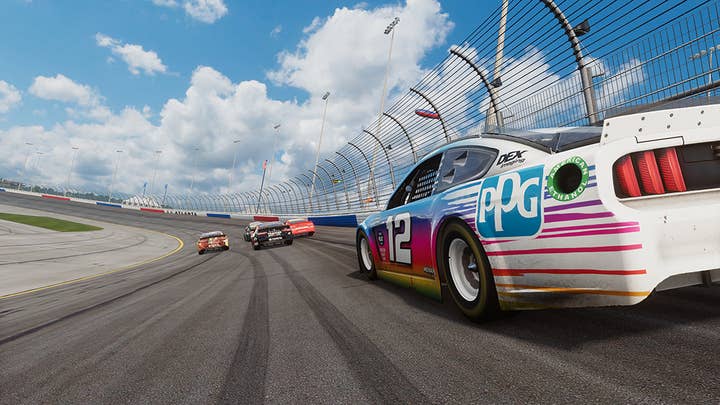Media firm behind Autosport plans to "change the landscape" of racing games
Ex-Codemasters creative director Stephen Hood on how the new Motorsport Games group can disrupt the market
Last weekend at the Autosport International, media company Motorsport Network unveiled its games development operation.
The publisher behind racing news sites such as Autosport, Motor1 and of course Motorsport has quietly been establishing a presence in the industry for a few years now. This has been primarily through esports tournaments, with the company defining video games as a fourth pillar to its business (alongside racing and automotive publications, plus its live events operations).
The owner of Motorsport Network is so convinced that gaming is a natural extension of the business that for the last two years, a new division -- Motorsport Games -- has been taking shape. Now unveiled, it encompasses a development studio in Orlando, Florida, another in Moscow, a controlling stake in NASCAR developer 704 Games (acquired in 2018), a new games studio, and an esports facility at the UK's famous Silverstone racetrack, plus an office in London that serves as the hub for the whole operation.

But why is a media company getting into games development? For Stephen Hood, who has been serving as president for 18 months, it's much the same reason he came on board: a desire to do something different in the racing space.
"I joined because they weren't traditional games developers," he tells GamesIndustry.biz. "Traditionally, a game developer acquires a licence and just makes an official product. You get these rinse-and-repeat factory efforts. What we're able to do is suddenly get access to a lot more racing series, personalities and the people within, which for me is the colour of motorsport. It's not just about getting the tracks and the cars.
"The work we're doing with NASCAR, for example, means it's not just the official NASCAR game. I can put the legend icons in there, I've got NASCAR's involvement, and a joint venture with the Race Team Alliance in the US. We work with the drivers, I can get the crew chiefs in there, I get access to the personalities that I wouldn't be able to do at a standard developer. The doors are opened because of the size of the network, so I have new opportunities."
Naturally, having a direct channel to media outlets will be an advantage when it comes to reaching the targeted audience, but there are also plans to build a community-focused hub for everything Motorsport Games is doing. This would be a stretch for a traditional developer, but the Motorsport Network has an array of editorial, video, social media and other teams that the games division can draw on. The finished site will feature news, reviews, video content, podcasts -- and not just on the company's own products, but even those of its rivals.
"It's not just a Motorsport Games-dominated platform," says Hood. "This is about the racing space and blurring the lines between real motorsport. Our platform gives us the opportunity to move away from more of the expected standard of Autosport and present real-world motorsport news in a very different format, and bleed that into the games operation. So what's going on in a real World Endurance Championship or IndyCar, and how does that work with our video game properties?"
"We have the capability to make players fans of motorsport series they probably didn't even recognise to begin with"
Of course, as the games hub will inevitably show, racing fans aren't exactly starved for choice when it comes to video games. There's Gran Turismo, Need For Speed, Forza (and its Horizon spin-offs), Codemasters' three-pronged attack of F1, Dirt and Grid, and the myriad of motorcycle racing games from Milestone -- to name but a few. The motorsport space is already crowded so how can a newcomer, even with its impressive connections, ever hope to compete?
"It's a good question, and since the focus on motorsport means we'll only be making racing games, you could easily argue we'll be cannibalising our own market," Hood adds. "But the answer that I have to that is we are willing to do things differently. We've made many of those games, the people I have in the organisation and those that are joining over the coming days, weeks, and months are some of the key individuals behind a lot of those recognisable brands and games. They built them in a particular fashion. There were limitations at the time, and we are prepared to do things differently that I think will result in better experiences.
"No, I don't have the Formula One licence. I'm not chasing the rally licence -- there was an opportunity there, but I don't think it's right for us. Yes, we do have NASCAR, which is big in the US, but then we also have good relationships with other motorsport series. Codemasters aren't going to make a British touring car game, but I think the market is deserving of one.
"I don't even care if you're not a fan of these series -- we have the capability to make players fans of motorsport series they probably didn't even recognise to begin with. I'm not just selling a NASCAR game to a NASCAR fan or an IndyCar game to an IndyCar fan, I'm going to sell it to sports fans, racing fans. The very niche market is tied up right now. We're going to try to do something that will appeal to a much wider market of gamers and motorsport enthusiasts. The proof will be in 2021 when our first internal projects start to hit the shop floor."
As Hood mentions, he has made these games before. He spent more than five years working at Codemasters on various racing titles and another five at Sony Liverpool working on projects such as F1 2001 for the PlayStation 2's launch. And he's building a team of similarly experienced racing veterans around him, with the company's headcount now at 50.
Recruitment efforts are ongoing, with plans to reach 75 to 100 staff by the end of the year, although Hood stresses the focus is on "hiring the right people as and when, not just putting bums on seats." Beyond that, growth will be conservative -- Hood's own experience of working at studios with 200 or more people have convinced him that it's impossible to get that large a team thinking or pulling in the same direction.
"Players all want to feel like that hero driver. It's easier said than done, but many of us have been doing that for a number of years and we're out to turn the tables on our previous employers"
Motorsport Games' first release will be the next NASCAR title, continuing 704 Games' popular series, but it's also planning to release new games each year that service different sports. This will be on a case-by-case basis, with Hood emphasising that: "We're not out to make 15 distinct different racing games that we release each year, but we do want to change the landscape."
NASCAR will continue to be made available for the current consoles, but Hood says "nothing is off limits" for future releases. The new company is already looking at Switch, mobile, and even streaming platforms like Stadia, although the team is conscious of stretching itself too thin. To that end, it's focusing on Xbox One and PS4, but is inevitably gearing up for Xbox Series X and PS5. In fact, Hood and his colleagues have already met with the Microsoft team, who were reportedly impressed by what Motorsport Games plans to bring to the genre.
"We've needed the power of the new generation of consoles in order to blur the line between high-end PC simulations and what we at Motorsport Games are trying to build," says Hood. "These aren't toys, they're going to be authentic racing games that will appeal to a great many people."
That promise of authenticity can be something of a barrier to the mainstream audience Motorsport Games is hoping to reach. For some, authenticity equals simulation, which requires a knowledge and appreciation of how physics really apply to racing. It's easier to pull off that perfect drift in an arcade-style title like Need For Speed than it is in the realistic Project Cars. How can the developer strike the balance between authentic and accessible?

"That's the age old problem," Hood acknowledges. "About 20 or so years ago, I was leading designer on a Formula One game for Sony and the studio manager told me the game should be both arcade and simulation, and there should be a choice in the menu so players could decide what kind of experience they wanted. I was against that from the beginning, because it means you create two completely different games and you don't have two completely different teams. It saps your resources.
"I don't believe in arcade or simulation for motorsport series, I believe in you having a degree of control over the authenticity of the product. If a racing game is authentic, it doesn't mean it's difficult to drive. A simulation portrays things that happen in the real world -- I actually find sometimes it's difficult to play games that are not based on reality, that are built on a pseudo-reality that exists within that game, because you have to learn how the car in that video game expects you to drive. You can't really draw upon your real-world knowledge."
Conversely, Hood argues that entirely arcade-like games can be highly unrealistic and require players to learn the specific mechanics of that title. Motorsport Games will be aiming for a sweet spot between the two, although Hood notes it will depend on the game. NASCAR is "more about the sport than being an elite driver," but if the company were to ever make a Formula One game it might focus more on the latter.
"Players all want to feel like that hero driver -- there are just different ways of doing [that]," he concludes. "It's easier said than done, but many of us have been doing that for a number of years and we're out to turn the tables on our previous employers."
